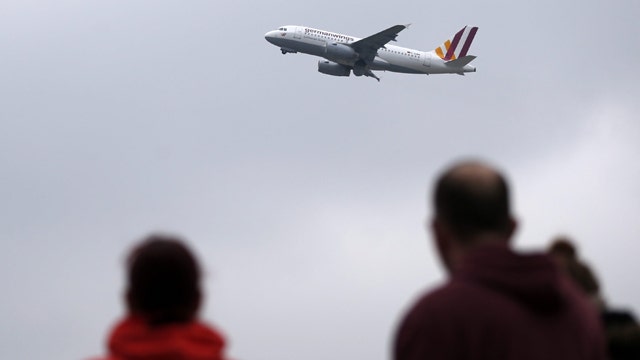Report: Transcript reveals captain yelling ‘open the door’
Black box shows final moments of Germanwings flight
The co-pilot believed to have intentionally crashed a plane into the French Alps last week, killing all 150 aboard, had been treated for "suicidal tendencies," German prosecutors said Monday.
Andreas Lubitz, the 27-year-old co-pilot who investigators say locked the Germanwings Flight 9525 pilot out of the cockpit and crashed the Airbus A320 last Tuesday, received psychotherapy "with a note about suicidal tendencies" for several years before becoming a pilot, according to Ralf Herrenbrueck, spokesman for prosecutors in Dusseldorf. Still, Herrenbrueck said no motive has emerged to explain the act, and said Lubitz showed no sign of a physical illness.
Herrenbrueck said that since Lubitz received his license, documentation had shown no such treatment.
"In the following period, and until recently, further doctor's visits took place, resulting in sick notes without any suicidal tendencies or aggression against others being recorded," Herrenbrueck said. "There is no evidence to show that the co-pilot was about to do what he appears to have done."
The development came as a transcript of the final minutes of the doomed flight, recorded by the black box, revealed the horrific and frantic final moments as the plane's captain, Patrick Sonderheimer, yelled at Lubitz to “open the door” 5 minutes before the plane began its 8-minute descent into the mountain at 430 mph.
"For God's sake, open the door!" Sondenheimer screamed as he banged on the cockpit door, according to a transcript obtained by the German newspaper Bild.
The Telegraph reported that Sonderheimer took an ax to the locked cockpit door in a last-ditch attempt to avert the crash. Minutes prior, Sondheimer was heard telling Lubitz that he was going to the bathroom and giving permission to Lubitz to “take over.” After the captain knocked on the door to get back into the cockpit, the plane began its descent prompting an alarm to sound.
Sondheimer never heard a response from Lubitz as the aircraft flew into the ravine.
The full transcript has yet to be publicly released, the newspaper reports. The black box captures up to two hours of the pilots’ conversations as well as other cockpit noises.
Bild also reported that Lubitz's girlfriend was pregnant with his baby, but that could not be confirmed.
Saturday, The Wall Street Journal reported that Lubitz’s eye difficulties were serious enough to ground him. Investigators told the paper that the 26-year-old had been examined by an eye specialist and that the appointments appeared to have taken place at University Hospital Dusseldorf.
The paper said evidence uncovered during searches of Lubitz’s apartment and his parents’ home indicated he had his eyes examined and was being treated for depression.
The Journal said Lubitz was being seen by a neuropsychologist for depression. The doctor gave Lubitz a note excusing him from work the day of the crash, but he ignored the advice and reported to work, the paper said, citing its source, a person familiar with the investigation.
German prosecutors reported Friday that Lubitz shredded the doctor’s notes for the day of the crash and other days, supporting their assessment that Lubitz hid his “medical illness” from his employer and colleagues. They refused to say if the hidden illness was depression.
The Journal said that while Lubitz had sought to conceal his mental illness, there was no evidence that the fear of losing his medical classification as being fit to fly triggered his actions, though “this would be a plausible explanation,” the person said.
His pilot's license is up for renewal in July and would be in jeopardy if he was diagnosed as mentally ill.
The person told the Journal there was no evidence Lubitz was taking “mind-altering” medication that could have affected his judgment in the cockpit.
“When someone makes the same decision five or six times, all leading toward one specific end, you have to assume they are acting intentionally,” the person told the paper, alluding to Mr. Lubitz’s lack of reaction when urged by the pilot to open the locked cockpit door. Prosecutors said the cockpit voice recorder showed Lubitz breathing normally in the last moments of the flight, even as the pilot tried to get back into the cockpit and passengers screamed for their lives.
The Journal quoted a Lufthansa spokesman as saying: “All we know was that he had a clean background.”
Dusseldorf prosecutor Christoph Kumpa said Friday the doctor's note for the day of the crash indicated Lubitz "was declared by a medical doctor unfit to work."
Bild on Friday said Lubitz had been designated as "not suitable for flying" by his instructors at Lufthansa's training school in Arizona around the time that he halted his pursuit of a pilot's license in 2009.
The tabloid said Lubitz spent 18 months receiving psychiatric treatment, was diagnosed with a "severe depressive episode," and received what it called a "special regular medical examination."
Neighbors described a man whose physical health was superb and road race records show Lubitz took part in several long-distance runs.
Prosecutors said there was no indication of any political or religious motivation for Lubitz's actions on the Barcelona-Dusseldorf flight.
The Associated Press contributed to this report.





















